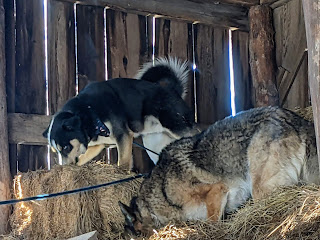Recognizing Common Distractions
The Emotions Behind the Distraction
In February we discussed how emotions impact our dog's behaviors. Our dog's reacting to any distraction is based on the emotional feeling they get when the first see, smell, or hear that distraction. Their behavior helps us to determine which emotion they are feeling. Here are a few of the common emotions that are impacted by distractions.FEAR - A distraction that causes a fear reaction can cause mild avoidance behaviors or extreme outrage behaviors. These are some of the hardest distractions to work around as it takes a very long time to change a fear emotion in a dog. And you may not be able to completely take away that fear, but you can help the dog to learn to trust in you, recall previous training to help them remember the best way to proceed safely, and teach teamwork skills so that you both can avoid these distractions as safely as possible.
JUDGEMENT/EVALUATION - This is a core survival response to a distraction and often what happens when we come across unknown dogs. With a previous history of meeting the distraction sometimes ending on a happy note and sometimes ending an not so good note, dogs will slide into this emotional state of trying to access the situation. They are not sure yet if the distraction is a friend or foe and they want to proceed with caution.
ALERT/AWARE - This type of response is more like, "Oh wow, there is a distraction but we are good here and can continue what we were doing before we saw the distraction." This is what most of us aspire to or what we wish our dog did with distractions! This is what we train for when we play the Look at That Game.
HAPPY EXCITEMENT - This can often seem like a mild fear reaction with some of the same behaviors presenting such as barking, pulling, or other spaz type reactions. The big difference is that with a fear reaction the dog's body language is often tense and with excitement the dog's body language is often loose and wiggly. This can be just as difficult to gain focus from a dog in this emotional state as in a fear state, but it's much easier to help them de-escalate with some practice.
OVER-ENTHUSIASTIC - This response usually comes from a happy state of mind, but the dog is so amped up that they really can't hear anything their person is asking them to do. This is where we as owners tend to get into trouble because the dog can easily hurt us or that distraction simply due to their bounciness.
There are many possibilities between those basic emotional reactions, but we are going to try to focus on those for our March Madness posts. Each one of those basic emotions needs to be addressed in slightly different ways and using different types of reinforcers or motivators to help redirect our dog's attention back on us. That is why we really need to determine what the emotion behind the distraction is before we can create the training plan around that distraction. So in making your list, put a negative (-) mark next to distractions with emotional states that are fear/anxiety based and double negative (--) next to the distractions that cause the "create space" behaviors of barking or snapping. Then put a positive (+) mark next to the distractions that cause excitement based emotions and a double (++) mark if that distraction sends your dog over threshold for ability to even listen to you.
Cam: Strange Dogs --, Balls -+, treats (can be + or ++ depending on the day), squirrels +, deer ++
Azul: Strange Dogs ++, Dog Friends +, Treats -, squirrels +/++, strangers/people +, people friends ++, trail scents start out +, but too many too quickly turn into ++.
Every dog is different! So do your best to figure it out and if you need help, let me know! I'm happy to help!




.png)


